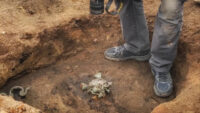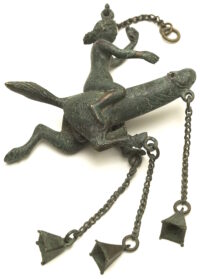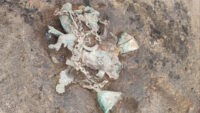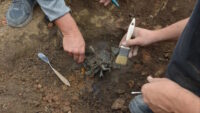 A Roman phallic wind chime was discovered last week at the ancient site of Viminacium in Serbia. The object, known as a tintinnabulum, is made of bronze and has an intricate design of a central winged phallus with additional projecting phalluses and four bells hanging from chains. It is only the second tintinnabulum ever found at Viminacium, and the only one found in its original archaeological context. Nothing is known about the discovery of the first one and the object itself is in a private collection in Austria.
A Roman phallic wind chime was discovered last week at the ancient site of Viminacium in Serbia. The object, known as a tintinnabulum, is made of bronze and has an intricate design of a central winged phallus with additional projecting phalluses and four bells hanging from chains. It is only the second tintinnabulum ever found at Viminacium, and the only one found in its original archaeological context. Nothing is known about the discovery of the first one and the object itself is in a private collection in Austria.
Located about 30 miles east of modern-day Belgrade, Viminacium had a large permanent military camp garrisoning the border with the Goths and was the capital of the Roman province of Moesia Superior. It had the largest amphitheater in the Balkans and the largest cemetery discovered anywhere in the territory of the Roman Empire. The site has been excavated regularly since its rediscovery in the late 19th century. The current excavation is exploring the civilian settlement that grew around the military base.
 “The investigation of the civilian settlement (city) of Viminacium has just begun, and the first significant discoveries have already been made. During the excavation of one of the main city streets, the gate of one of the buildings was discovered. It was established that the building was destroyed in a fire, during which the porch collapsed and fell to the ground, and in the garage layer an object known in scientific circles as a tintinnabulum was discovered ,” [said Ilija Danković, an archaeologist at the Institute of Archaeology in Belgrade].
“The investigation of the civilian settlement (city) of Viminacium has just begun, and the first significant discoveries have already been made. During the excavation of one of the main city streets, the gate of one of the buildings was discovered. It was established that the building was destroyed in a fire, during which the porch collapsed and fell to the ground, and in the garage layer an object known in scientific circles as a tintinnabulum was discovered ,” [said Ilija Danković, an archaeologist at the Institute of Archaeology in Belgrade].
 Tintinnabula were often hung near or on doors as an amulet to ward off evil. They were usually made of bronze and featured that favorite of Roman talismans, the fascinus, or phallus. The phallus represented the deity Fascinus and had apotropaic powers; ie, the ability to avert evil or bad luck. Bells were also apotropaic as their ringing was believed to frighten away evil spirits, so tintinnabula were doubly powerful protection.
Tintinnabula were often hung near or on doors as an amulet to ward off evil. They were usually made of bronze and featured that favorite of Roman talismans, the fascinus, or phallus. The phallus represented the deity Fascinus and had apotropaic powers; ie, the ability to avert evil or bad luck. Bells were also apotropaic as their ringing was believed to frighten away evil spirits, so tintinnabula were doubly powerful protection.
 The phalluses in tintinnabula morphed into a variety forms. They could be deities, humans, wolves, lions, winged beasts, monsters, a combination of several. Frequently more than one phallus sprang out from the figure. The recently-discovered Viminacium example is either being ridden by an anthropomorphic figure with legs or has its own legs. It has been recovered encased in soil for careful micro-excavation in laboratory conditions. Its configuration will be revealed once it has been cleaned and conserved.
The phalluses in tintinnabula morphed into a variety forms. They could be deities, humans, wolves, lions, winged beasts, monsters, a combination of several. Frequently more than one phallus sprang out from the figure. The recently-discovered Viminacium example is either being ridden by an anthropomorphic figure with legs or has its own legs. It has been recovered encased in soil for careful micro-excavation in laboratory conditions. Its configuration will be revealed once it has been cleaned and conserved.
* This article was originally published here

“The investigation of the civilian settlement (city) of Viminacium has just begun, and the first significant discoveries have already been made. During the excavation of one of the main city streets, the gate of one of the buildings was discovered. It was established that the building was destroyed in a fire, during which the porch collapsed and fell to the ground, and in the garage layer an object known in scientific circles as a tintinnabulum was discovered ,” [said Ilija Danković, an archaeologist at the Institute of Archaeology in Belgrade].











No comments:
Post a Comment